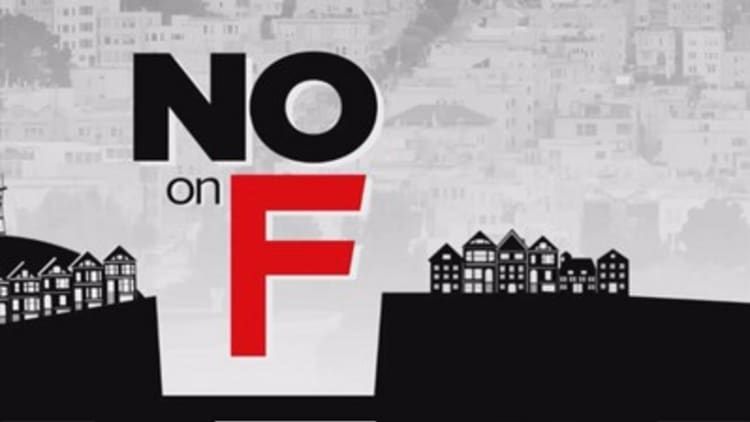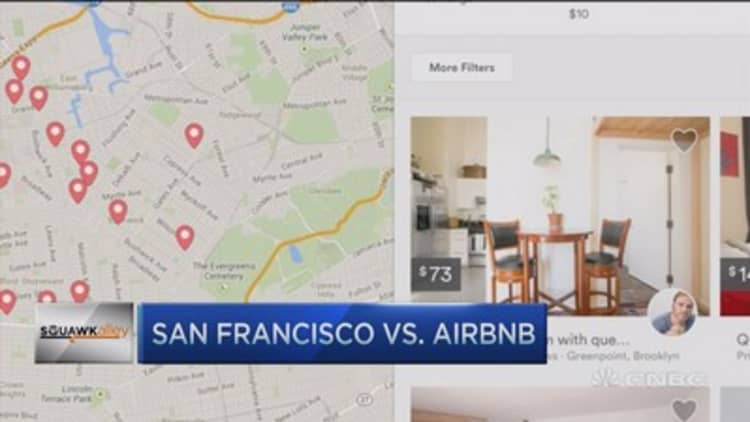
Airbnb has successfully defended its home turf, but not without a cost.
Proposition F, the San Francisco ballot measure that would have capped private home and room rentals at 75 nights a year and imposed fines on unregistered units, was rejected by voters on Tuesday, with 55.1 percent opposing and 44.9 percent in favor.
Rack up another win for the darling of the sharing economy, and the tech community broadly. And another blow to housing advocates concerned about the explosion in the cost of living. (The average one-bedroom apartment in San Francisco rents for a startling $3,670 a month, according to Zumper.)
From a financial perspective, San Francisco isn't that important to Airbnb. According to Beyond Pricing, which tracks the vacation rental market, the company's home town only accounts for about 0.3 percent of global inventory.
"The battle in SF is more about setting a precedent for reasonable legislation than it is about Airbnb's bottom line," said Ian McHenry, co-founder of Beyond Pricing.
Because of that precedent, Airbnb wasn't willing to concede anything. The company, more so than HomeAway, was the primary target of the initiative which, in addition to limiting rental nights, would have forced hosts to pay hotel taxes and follow city code as well as produce revenue reports every quarter.
It would also have let neighbors take legal action against offenders. Suspicious of the house next door and all the raucous parties? There's a lawsuit for you.
In turn, Airbnb spent $8 million on a campaign to defeat the measure (versus $300,000 from supporters) and gained vocal backing from tech-friendly Mayor Ed Lee and legendary start-up investor Ron Conway.
While Airbnb was victorious, it bungled the message along the way with some over-the-top advertising. Most embarrassing was a bus stop ad telling the San Francisco public library system that "we hope you use some of the $12 million in hotel taxes to keep the library open later."
Airbnb was making a joke, referring to its hefty annual tax bill to the city. Nobody found it funny. "It was the wrong tone and we apologize to anyone who was offended," the company said in an internal e-mail announcing it was pulling the ads.
In some ways, Prop F is a microcosm of Airbnb's global challenge.
The company claims that it's unlocking economic potential, providing a greater abundance of affordable tourist housing and allowing homeowners to make some cash from an idle spare bedroom or vacant unit.
Critics say Airbnb is simply enabling landlords to game the system by turning permanent apartments into short-term rental units and profiting handsomely while cutting off housing supply in cities where rents are already unmanageable.

Airbnb, for its part, is fine with regulation—just not brute force. The company has government relations employees across the world, particularly in Europe, helping write rules where they previously didn't exist.
For example, in Paris, Airbnb's biggest market, the company recently said it would start collecting tourist taxes.
"Airbnb has indicated that they want regulation, they want clarity," said Nathan Tobin, head of growth at Guesty, a site that helps Airbnb hosts manage their bookings. "The posture of activists in the Bay Area has been very adversarial."
In fact, San Francisco implemented a law in early 2015 allowing short-term rentals for 90 days a year when the host isn't present (Rooms in owner-occupied houses don't face such limits). Hosts breaking the law are subject to fines of $1,000 a day.
Enforcement has proven challenging, a major reason why the latest measure was designed to allow private citizens to take action.
"Apparently San Francisco doesn't have the manpower to really enforce it," said Stephen Fishman, a Bay Area attorney and author of numerous books including The Real Estate Agent's Tax Deduction Guide. Still, "we have a law, we should see if it will work," he said.
Read MoreTech's quest to revive San Francisco's underbelly
Semil Shah, an early-stage tech investor and long-time Bay Area resident, sympathizes with both sides.
Tech money from the likes of Facebook, Apple and Google has poured into San Francisco real estate and driven up prices at the expense of just about anyone not in the tech sector.
But Airbnb is hardly the culprit.
"There's an incredible, compounding rate of liquidity coming into the Bay Area, and there will be more coming in," Shah said. "Combine those forces with the fact that individuals from other countries are buying properties in the Bay Area to park some of their wealth here, and what you have is a frenzied real estate market."



